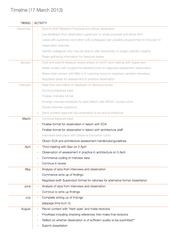|
Technological advances and pedagogical innovation are helping to reshape the online classroom. In particular, the potential exists for students to express ideas in new ways. Armed with a growing array of digital tools, online students can exploit different modes in the preparation of coursework assignments. Podcasts, films, web essays and digital dissertations now complement or even replace the traditional text-based essay. In some cases, a single essay might present ideas in oral, textual and visual form. The online classroom is being reframed as a place of multimodal learning populated by transliterate students.
While this multimodal classroom provides exciting new ideas for the dissemination of ideas, a shift towards the presentation of work in non-traditional digital formats inevitably has implications for online teaching and feedback. As the online classroom evolves, so there is a need for tutors to adapt to these new modes of communication. Tutors face the challenge of assessing the quality of academic work that is presented in non-traditional formats. We may need to rethink the assessment criteria that have been used to express words on screen or page. How do we apply standards of academic rigour to a build in Second Life or a hypertext essay? And beyond how the tutor actually assesses the non-traditional assignment, is there a need to rethink the format used to provide feedback - is it appropriate to use textual feedback to comment on an assignment submitted as a podcast? In this dissertation I will:
0 Comments
Leave a Reply. |
Categories
All
Archives
October 2013
TimelineOther stuff
|
